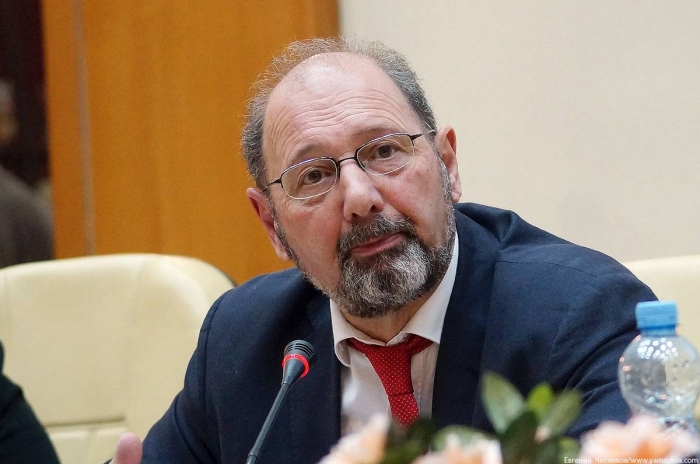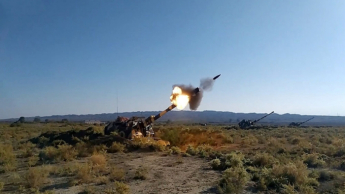EXCLUSIVE: Richard Sakwa: "Overconfidence of Armenians led to disaster" - VIDEO INTERVIEW

An interview to Baku Tribune was given by Richard Sakwa, Professor of Russian and European politics at the University of Kent. He has written books about Russian, Central and Eastern European communist and post-communist politics.
An interview to Baku Tribune was given by Richard Sakwa, Professor of Russian and European politics at the University of Kent. He has written books about Russian, Central and Eastern European communist and post-communist politics.
- As you know, the second Karabakh war ended with the victory of Azerbaijan over Armenia, and Azerbaijan liberated 7 regions around Nagorno-Karabakh and the southern part of the Karabakh region. But the liberated territories are mined. The UK has recently allocated £500,000 in the form of assistance in demining Karabakh, the British Foreign Office said in a press release. How do you rate this? What additional contribution could Great Britain make in the revival of Karabakh?
- I must say, I very much welcome the British support for demining the contested parts because clearly, villages have a long experience of this in some conflicts in Africa. If you remember Princess Diana was really concerned about the mines as a danger to life. Of course, this expertise will be important in Afghanistan as well now.
So it's very welcome and very important because as I said, Britain has special expertise in this field. Overall though the United Kingdom has a relatively marginal role to play in this conflict. I think that the most important way it can help is there are many British NGOs involved, which I think could help facilitate discussions. They can facilitate prisoner exchanges because that is a fundamental issue now. They can try to restore some sort of normal life and act as mediators. Obviously, the Russian peacekeeping forces are the most important ones, Turkey has an office as well. But Britain’s particular expertise can be in conflict mediation, and conflict resolution because ultimately we need to find put an end to the Karabakh conflict which is satisfactory to all parties.
As you say, you put it without a delicacy that Armenia lost the war, which of course, it did in a most spectacular fashion, but I think that Azerbaijan should also understand the victory that one should always be. How can I put it? Tolerant and generous in victory and only that way because clearly, it has achieved all of its goals and more in this Second Karabakh War. And so I think that it would be in Azerbaijan`s interests to now suggest a generous settlement that would mean obviously full autonomy and cultural rights of the Armenian population of the territory Nagorny Karabakh.
As for the final constitutional position I would suggest that you know obviously, there`s been a discussion for so many years if not centuries on this issue, but clearly a generous settlement of autonomy, to guarantee the guides of all citizens, equality of citizens in that region to allow economic development humanitarian support and finally for peace and development to dominate between these two countries. And of course, we do need some more, how can I put it, trust-building between Azerbaijan and Armenia, whether you like it or not, you are neighbours.
And so neighbours ultimately have to learn to live with each other. Azerbaijan achieved, you know a major achievement for contact and direct links with Nakhchivan and so you know, in the sense that Azerbaijan really is the bigger country. It's a richer country and now a more powerful country. So as I say, it needs to be generous in the settlement today.
- How do you see the further development of the situation in Karabakh, taking into account the deployment of Russian peacekeepers there? What new challenges, in your opinion, may Azerbaijan face in the future? Do you think Russian peacekeepers will stay in Karabakh for a long time?
- Well, Russian peacekeepers will stay as long as they – parties obviously, it's their own Azerbaijani territory today. So as long as Baku, and obviously, in some ways, Yerevan agreed to it. So, I mean, Russia`s has no territorial claims down there. Obviously, it has military bases and a military alliance with Armenia, but only in terms of self-defence and so Russia behaved I think absolutely correctly in this latest war. And of course, it's facilitation. The problem is that Turkey, how can I put it, as an expansive or certainly dynamic power and Turkey`s role in all of this has to be taken into account. So whether the peacekeepers will stay there, obviously, they're very time-constrained at the moment and of course, I think they should stay as long as Azerbaijan and Armenia have not come to a peace settlement that satisfies all the parties including the minority. Obviously, Armenia was very foolish in refusing to accept the deals that were on offer for what nearly 30 years after the first Karabakh War. And those negotiated settlements had an exaggerated view of their own power and potential. And of course, this war has brought them back, the Second Karabakh war took them down to earth.
So you know whether Russia will stay there, obviously, we want to avoid more bloodshed, and we want to convey the conditions for peace and development and it's in the interest of Baku to do it. So, I think that is the danger of Baku doing it. So I think today that the danger of Baku is triumphalism, is to overplay its hand and so this is why I say that now with Baku as the victorious power, it is in the position to be generous in victory. I stress that because obviously, we understand, but Azerbaijan has its concerns, of course, it's in this larger context of West Asia, as I now call it, not the Middle East. West Asia in which of course with issues with Iran, Afghanistan is not far away. So the larger geopolitical context has to be taken into account. And as I suggested earlier, the larger geopolitical tectonic plates are moving. So Azerbaijan should anticipate that its position may not always remain so advantageous, so it's best to lock Armenia now some sort of peace deal that's obviously satisfying its concerns, but which at the same time allows the other country`s breathing space to develop.
- Do you believe in a peace agreement between Azerbaijan and Armenia?
- Yes, I do. I think must be one. it`s going to be hard. We, you know, have the experience of this in Northern Ireland. This was an intractable conflict. You know been going on since the settlements of the 17th century, but it's when then we had 30 years of war but as Jonathan Powell, who was Tony Blair`s chief of staff, argues there has to be dialogue. Ultimately all wars end in dialogue and diplomacy. So yes, and so therefore I know that Azerbaijan has a developed diplomatic community. It's got a lot of expertise. Many of its officials have studied abroad, including in Moscow. So it's, you know, it's got good stuff and I think also Azerbaijan after it faced so many difficulties since the 30 years of independence that it's now become more mature and more developed and more, how can I put it, a confident country. But let us hope that this confidence doesn't become overconfidence just like the Armenian overconfidence led to disaster. So yes, a peace deal will come if it's this year. Next year, 10 years or 50 years sooner or later become.
So why not do it sooner, and that's my argument. And I think that the Northern Ireland peace deal and the new deal for IDP's (Internally displaced people) in 1998 is a very good example of how to achieve this.
Interviewed by Seymur Mammadov
The Rocket and Artillery formations of the Azerbaijan Army conduct live-fire exercises in accordance with the combat training plan for 2021, the Ministry of Defense of Azerbaijan told Baku Tribune.
LAST NEWS






.jpg&h=67&w=67&zc=1&q=100)













